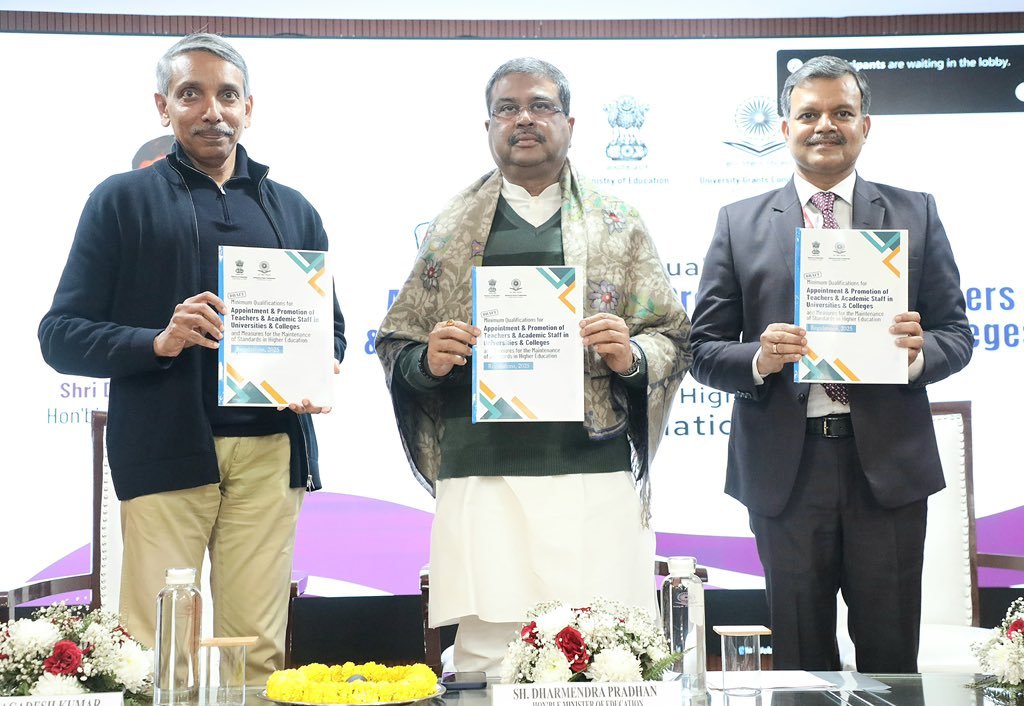Context:
Recently, the Union Ministry for Education released the draft UGC (Minimum Qualifications for Appointment & Promotion of Teachers and Academic Staff in Universities and Colleges and Measures for the Maintenance of Standards in Higher Education) Regulations, 2025.
More on the News
- The UGC has given 30 days for the stakeholders and public to offer feedback and suggestions on the draft.
- Union Minister for Education also inaugurated ‘Pushpagiri’, the new auditorium of the Universal Grant Commission (UGC).
Key Highlights of the UGC Regulation 2025
Flexibility: Candidates can qualify for faculty positions through the NET/SET in a subject of their choice, even if different from their undergraduate and postgraduate degrees
- Also, the subject of the Ph.D. degree will take precedence over prior degrees.
Appointment of Vice-Chancellors: The draft has given the powers to Chancellors or Visitors to constitute the three-member search-cum-selection committee to appoint Vice-Chancellors.
- So far, the State governments used to constitute the search committees for appointing Vice-Chancellors.
- The regulation also opens the VC post to individuals from industry, public policy, public administration, or public sector undertakings, thus breaking from the tradition of selecting only academicians.
Easier hiring of contract teachers: The draft regulation also removes the cap on contract teacher appointments. The 2018 regulations had limited such appointments to 10% of an institution’s total faculty positions.
Promoting Indian Languages: The regulation encourages the use of Indian languages in academic publications and degree programmes.
Holistic Evaluation: It also does away with the Academic Performance Indicators (API) system– a score that determines the recruitment and promotion of teachers based on parameters such as publication in journals.
- Instead, “Notable Contributions” across nine categories including “teaching contributions in Indian languages” and “teaching-learning and research in Indian Knowledge Systems” will be considered for recruitment and promotion of teachers.
Diverse Talent Pool: It creates dedicated recruitment pathways for experts in arts, sports, and traditional disciplines.
Inclusivity: It provides opportunities for accomplished sportspersons, including those with disabilities, to enter the teaching profession.
Simplified Promotion Process: Streamlines the criteria for promotions, emphasising teaching, research output, and academic contributions.
Focus on Professional Development: Encourages continuous learning and skill enhancement for teachers through faculty development programs.
Enhanced Transparency and Accountability: Promotes transparent processes for recruitment, promotion, and addressing grievances.
About University Grant Commission (UGC)
The UGC was formally established only in 1956 as a statutory body of the Government of India through University Grants Commission Act 1956.
The head office of the UGC is located in New Delhi.
The UGC`s mandate includes:
- To Promote and coordinate university education.
- To Determine and maintain standards of teaching, examination and research in universities.
- To Framing regulations on minimum standards of education.
- Monitoring developments in the field of collegiate and university education and disbursing grants to the universities and colleges.
- Advising the Central and State governments on the measures necessary for the improvement of university education.

